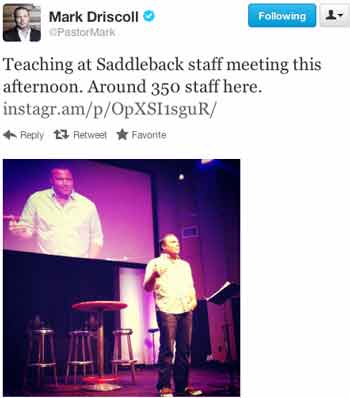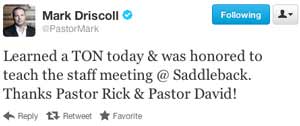THE RESURGENCE REMINDS US OF THE PIPER-WARREN EMBRACE
By Ken Silva pastor-teacher on Sep 12, 2012 in Current Issues, Features, Rick Warren
By Christian Research Network Associate Editor Erin Benziger of Do Not Be Surprised…
This is a repost of an original article on Do Not Be Surprised…It may only be September, but the snowball-effect is in full swing as the visible church continues its steady tumble down the slippery slope of compromise.
Mark Driscoll’s The Resurgence, which “services Christian leaders through books, blog posts, conferences, and classes,” continues to build publicity for its upcoming conference. The conference, scheduled for 9–10 October 2012, boasts a curious lineup of speakers, especially for the New Calvinist Driscoll and his ministry. Many who follow Driscoll and The Resurgence may be surprised to find a schedule full of seeker-driven motivational speakers:
Source Perhaps it is this walk down the seeker-sensitive path that scheduled speaker James MacDonald ofHarvest Bible Chapel was referring to when he noted:
The Resurgence conference is not going to be another tribal gathering but a gathering of tribes, united by grace as one body in Christ. We want to bring together different voices, traditions, and backgrounds to show that the most significant, life-changing, can’t-miss, unifying theme of first importance for the church across all time, all countries, and all peoples is Jesus Christ. The conference will be an invitation to pastors, church leaders, and Christians everywhere to make it all about Jesus in life and in ministry. (Source)
As the visible church continues to weaken and compromise its stand for biblical truth, the call for unity at all costs grows stronger and louder. Accompanying this seems to be a revival of the same man-centered, “purpose-driven” doctrinal obfuscation which has been infiltrating the visible church for some time.
We saw in July that The Resurgence was aiding in this effort with its blog post, “You’re Created with a Purpose.” In that post was shared a clip of Rick Warren speaking at the 2006 TED Conference. Courtesy of Apprising Ministries, below are the final minutes of Warren’s lecture at TED. When listening, the reader would do well to remember that the TED talks are not a Christian event, and thus Warren’s audience likely would have included people of all religions and faiths as he stated:
Some people have the misguided idea that God only gets excited when you’re doing “spiritual things,” like going to church or helping the poor, or, you know, confessing or doing something like that. The bottom line is, God gets pleasure watching you be you. (Source)
It is interesting that the supposedly conservative Resurgence would promote such teaching. Yet, it truly does appear as though a new, ecumenical evangelical magisterium is forming as these leaders continue to influence and promote one another.
In New Calvinist Mark Driscoll Hangout with Seeker Driven Rick Warren, Ken Silva of Apprising Ministries shares video from Driscoll’s recent Google Hangout event with the propagator of Purpose Driven-ism. Though Driscoll recorded the event as if he and Warren were in two different locations, it seems that, at the time, he actually was at Saddleback Church. We know this because, as Silva shares, later that day Driscoll would teach at a Saddleback staff meeting:
Source
Source This brings us, then, to yesterday’s post at The Resurgence website entitled, “What does Rick Warren think about doctrinal depth?” Here we are directed to a 3-minute excerpt from John Piper’s 2011interview with Rick Warren. At the time of this interview it was the opinion of some that Piper’s attempt to welcome Warren into the mainstream as a sound and orthodox teacher was a dangerous and detrimental decision. As a leader in the New Calvinist movement, Piper’s acceptance of Warren would be noticeably influential. Even before this 2011 interview, Piper openly declared that he believed Rick Warren to be “theological and doctrinal and sound,” a statement which earned Piper a fair amount of criticism. With the consistent promotion of Rick Warren by groups such as The Resurgence, it seems that the fruit of this Piper-Warren embrace is beginning to ripen.
[PIPER]: [D]octrinal depth .You say worship—page 102, “Worship must be both accurate and authentic. God pleasing worship is deeply emotional and deeply doctrinal.”
[WARREN]: Doctrinal, that’s right.
[PIPER]: And 146, “Many church fellowships and small groups remain superficial because they are afraid of conflict.” So you are committed to deepening doctrine and not being afraid of conflict.
[WARREN]: Not at all.
[PIPER]: But Sunday morning is not tend to where you see that, the deepening of doctrine?
[WARREN]: Sunday morning—a lot of people think it’s not deep because I don’t use theological terms. I once taught a 12-week series on sanctification without ever using the word. I taught an eight-week series on incarnation without ever using the word. I did a 12-week series on grace—obviously, grace was an easy word to use—but when I did the names of God, you can use the names of God without having to dig into explaining now Jehovah Jireh, Jehovah Tiskenu, Jehovah Rapha, let’s explain all these terms. So what I like to do, as I’ve said, I like to teach theology without telling people it’s theology and without using theological terms. But here is my question, what creates deep preaching? That’s my question, what is deep preaching? And I would say it’s not deep until it gets to the heart and the character of the person. That I could teach through Revelation—
[PIPER]: Including God.
[WARREN]: Including God, that’s what I’m talking about. If you get to the heart and nature of God, you get to the heart and nature of God, I could teach through Revelation and explain all of the meaning of everything and not be deep. Today, a lot of people equate deep preaching, meaning I explain the background. Well, that’s not deep at all. Deep is life transforming. Simple does not mean shallow. Simple does not mean simplistic. Simple does not mean, you know, it’s lightweight. Simple means it’s clear. Paul says, “I’m afraid you’ve complicated the Gospel. I’m afraid that you get away from the simplicity of the Gospel.” And actually, you can—it’s easy to complicated the Gospel and it’s easy to confuse people. And I could—you know, I’ve got a doctorate and I could easily preach in a way people would walk out and go, Whew, boy, that was deep. Well, that wasn’t deep, it was just muddy.
[PIPER]: Yeah, confusing.
[WARREN]: Okay. Here is the difference between simple and simplistic. Simplistic is—simple is,“This is the day the Lord has made. Let’s rejoice and be glad.” Simplistic is, “Have a nice day.” There is deep theological truth behind this is the day the Lord has made. Let us rejoice and be glad. Simplistic is, have a nice day.
(Source, emphasis added)
One really must wonder how it is that a pastor—an under-shepherd of the Lord Jesus Christ—would admit to attempting to “teach theology without telling people it’s theology.” When did ‘theology’ become a bad word, especially for Christians? What is so off-putting about studying God and His nature and characteristics?
And, as an aside, why would one desire to teach a lengthy course on sanctification, and yet not use the very word as found in the Bible? If our English translations of Scripture, none of which are written at a particularly scholarly reading level (the KJV is said to be written at a grade 12 reading level, the NIV at grade 7; most other popular translations fall between or below these two), can use the actual word ‘sanctification’ (e.g. Rom. 6:19, 22; 1 Cor. 1:30; 1 Thess. 4:3; 2 Thess. 2:13; 1 Pet. 1:2), then why does a pastor, a man whose duty it is to preach the Word (2 Tim. 4:2), recoil from this and other “theological terms”?
A teaching does not have to be “muddy” or “confusing” simply because it includes defining and using theological terms with multiple syllables. Unless, perhaps, the recipients of that teaching are more accustomed to a pragmatic, me-centered approach to Christianity and the Bible. To imply that the average Christian cannot or does not want to learn these terms, which have been used throughout history to adequately explain the great truths of Scripture, is in fact a bit insulting. The true Christian ought not shy away from learning the rich truths of God’s Word. To whom, then, is Rick Warren catering?
The Resurgence has asked the question, “What does Rick Warren think about doctrinal depth?” In spite of his protests to the contrary, the answer as provided through Warren’s pragmatic practices appears to be: not much.
Further Reading
The Resurgence Revives Rick Warren’s Man-Centered Mythology
Rick Warren Harnesses the Power of Social Habits, but where Is the Holy Spirit?
No Compromise Ever: Episode 1
The original appears here.



